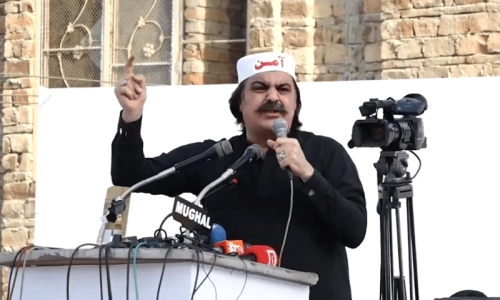
ISLAMABAD: In a fresh review of performance of the Benazir Income Support Programme (BISP), the leading government safety net authority, the World Bank has said that welfare losses from a wide variety of crises were significant in Pakistan and have deepened the gap between poor and non-poor and increased inequality among the provinces.
Pakistan has a low share of spending on social safety nets and with the rolling out of the BISP such spending increased from 0.3 per cent of the GDP in 2003-04 to 0.9 per cent, including selected subsidies meant to assist the poor. This spending is a very low amount compared to other developing countries, points out the analysis — “Pakistan towards an integrated national safety net system”.
In terms of prevalence of poverty, Pakistan is not too different from many other developing countries, but Pakistani households have to cope with a wide variety of crises which include global food-price increases, floods and militancy in parts of the country.
In addition to these external shocks, other burdens include household-level events such as illness or death in the family. Welfare loss is accompanied by a significant reduction in calorie intake.
Households cope with crises by switching to lower-quality or cheap food, reducing quantity of food intake, decreasing the non-food expenditures, spending savings or foregoing investments, and even decreasing education-related expenditures.
The World Bank analysis calls for increasing the coverage of social security programmes, saying that it remains low in Pakistan.
The prevalence of a large informal sector is one reason for this and a gradual increase in the coverage of social security programmes, which include informal sector workers, emerges as a priority.
The analysis says that a much higher percentage of households in the bottom quartile reduced the quantity of food intake than households in the top quartile.
The reductions in education expenditures were more significant for the poor households.
“Poverty is not the only factor that influenced how households were affected by shocks, however, food price increases had the greatest impact on urban households, which was probably due to their more limited access to agricultural land and thus subsistence agriculture option. Other shocks did not have the same visible impact on urban households.
“Among idiosyncratic shocks, health shocks were by far the most prevalent in Pakistan, and for many affected households, lead to poverty.”
Taking into account the original beneficiary selection approach that relied on parliamentarians, the analysis shows that the ineligibility filters, utilizing Nadra, turned out to be helpful in the targeting process; however this system suffered from critical shortcomings that prevented it from being a long-term solution.
In particular, many of the parliamentarian-selected beneficiaries who had high poverty scores also ranked high in terms of political connections and participation, implying that social networks mattered significantly in the selection process.
In addition to concerns about objectivity and transparency, there were other problems with the original system, such as difficulties in establishing a grievance mechanism for a subjective and heterogeneously implemented targeting mechanism.
The report says that with BISP household poverty survey having been completed nationwide, Pakistan has a credible poverty database, a significant accomplishment for a developing country.
The World Bank suggests that the government develop a National Beneficial Registry (NBR) system by capitalising on the BISP poverty database, defining the custodian authority at the national level to manage the updating of the NBR, and actively share data with federal and provincial government departments guided by data sharing protocols.
The analysis suggests reduction of untargeted price subsidies and says that subsidies on wheat, power etc, should be gradually diminished as the cash transfers to the poor are channelled through the targeted safety net programmes.
It calls for building on the cash transfer programme platform by implementing graduation programmes. Implementing such programmes will help some poor households exit poverty in the short term and reduce the likelihood of intergenerational transfer of poverty by investing in the human capital of poor children.
While Pakistan has plenty of experience with linking cash grants to education services, there is no such experience with linking grants to maternal or child health or nutrition services.
To explore this idea, which could potentially benefit the nutrition and health outcomes of mothers and children, a detailed survey of the available services needs to be carried out to identify the sector’s supply side constraints.
The World Bank suggests piloting of health insurance programmes among the poorest households, saying insurance against catastrophic illness would significantly improve the living conditions of poor households and prevent middle-income households from falling into poverty.












































